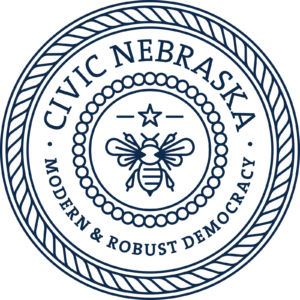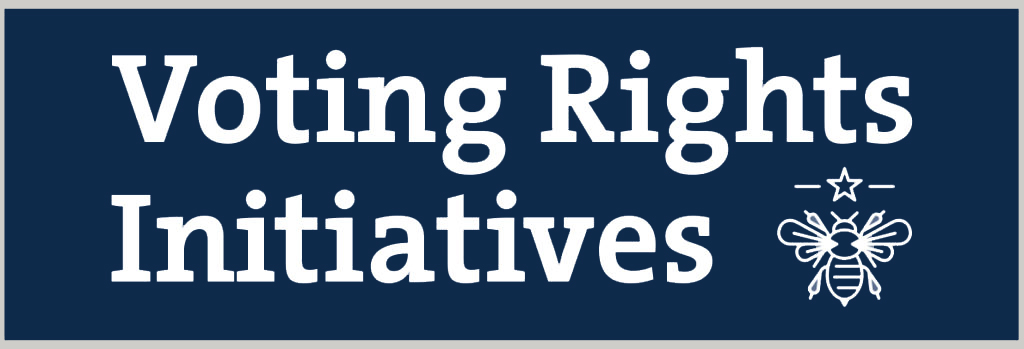Decoding the Ballot: 2024 Nebraska Elections
DECODING THE BALLOT is a nonpartisan guide designed to bring clarity to your options in the 2024 primary and general elections.
This nonpartisan resource from Civic Nebraska explains the roles, responsibilities, and compensation for elected offices on ballots for the Nov. 5 general election in Nebraska. Each entry has a brief description of the office’s responsibilities, terms, and salary, if applicable. For more information, please visit Election 2024 Central.
2024 Voter Guides
Flatwater Free Press – Lincoln Journal Star – League of Women Voters – Omaha World-Herald
Federal offices
4-year term beginning Jan. 20, 2025
$400,000 annually
Partisan
The United States will hold a presidential election on November 5, 2024. This will be the 60th presidential election in U.S. history.
Elected indirectly by citizens through the Electoral College, the president serves a four-year term. As chief executive, the president presides over the cabinet and has responsibility for the management of the executive branch. With the advice and consent of the Senate, the president also has the power to make treaties and to appoint ambassadors, U.S. officers, and judges to federal courts. He is also the commander in chief of the armed forces. The president signs laws and can veto bills that have passed Congress.
The president is elected by receiving 270 or more electoral votes, of which Nebraska has five. Ours is one of two U.S. states that allow for the splitting of electoral votes by Congressional District. This has occurred twice in Nebraska’s history, in 2008 and 2020.
2-year term
$174,000 annually
Partisan
Voters will elect three candidates to serve in the United States House of Representatives from each of our state’s three U.S. House districts.
Also referred to as congressmen or congresswomen, representatives are elected to a two-year term serving the people of a specific congressional district. Among other duties, representatives introduce bills and resolutions, offer amendments, and serve on committees. Since 1913, the number of representatives with full voting rights has been 435. The number of representatives per state is proportionate to its population.
To be elected, a representative must be at least 25 years old, a United States citizen for at least seven years, and an inhabitant of the state he or she represents.
6-year term
$174,000 annually
Partisan
Nebraska voters will select two members to serve in the U.S. Senate in the November 5, 2024, general election. The regularly scheduled election on Nov. 5 will fill the Class I Senate seat held by U.S. Sen. Deb Fischer (R-Neb.), who first took office in 2013.
›› Also, a special election will be held to fill the final two years of the current six-year term that former U.S. Sen. Ben Sasse (R-Neb.) was elected to in 2020. Sasse resigned from the Senate on January 8, 2023. On January 12, 2023, Pete Ricketts was appointed to fill the vacant seat by Gov. Jim Pillen.
The U.S. Senate is made up of 100 Senators, two from each of the 50 U.S. states. Senators’ terms are staggered so that one-third of the body is up for re-election every two years.
As in the U.S. House, Senators have the power to introduce, debate, and vote on proposed legislation. Senators also vote to confirm presidential appointments that require consent and provide advice and consent to ratify treaties. The Senate also tries impeachment cases for federal officials referred to it by the House.
Senators must be 30 years of age, U.S. citizens for at least nine years, and residents of the state they represent.
Statewide offices
Limited to two consecutive 4-year terms
$12,000 annually
Nonpartisan
Sample ballot
The state is divided into 49 legislative districts, each home to approximately 35,000 people. This year, 25 of the 49 districts are up for election. They include Districts 1, 3, 5, 7, 9, 11, 13, 15, 17, 19, 21, 23, 25, 27, 29, 31, 33, 35, 37, 39, 41, 43, 45, 47, and 49. See legislative district map
A single Legislature exists for two years, called a biennium. There are two regular lawmaking sessions per biennium. Each regular session begins in January.
Nebraska is unique in that it is the only state legislature in the country that is unicameral (one-house) legislature. Legislative authority and responsibilities include passing bills on public policy matters, setting levels for state spending, raising and lowering taxes, and voting to uphold or override gubernatorial vetoes.
6-year term
Unsalaried
Nonpartisan
Sample ballot
The Board of Regents is the governing body for the University of Nebraska System. The board is made up of eight voting members. The board also includes four non-voting student regents, one from each institution in the university system. These students serve during their tenures as student body presidents.
Regents provide strategic leadership to the university system. Among its many duties, the most important include selecting the president of the university, approving the budget, and setting tuition rates.
Three of eight seats on the University of Nebraska Board of Regents are up for election in 2024. They are Districts 3, 4, and 5 (see map).
4-year term
Unsalaried
Nonpartisan
Sample ballot
The Nebraska State Board of Education sets policy and ensures that the Nebraska Department of Education functions within the framework developed by the Legislature and the board. The board and the department have broad leadership functions to carry out certain regulatory and service activities.
A 1952 constitutional amendment established the Nebraska Department of Education, which acts under the authority of the State Board of Education. In 1967, the Legislature divided the state into eight districts, and the board’s membership increased from six to eight members in 1969. The districts were realigned by the 2021 Legislature. Members are not paid but are reimbursed for expenses.
Four of eight seats on the board are up for election in 2024. They are Districts 1, 2, 3 and 4 (see map).
6-year term
$75,000 annually
Nonpartisan
The Nebraska Public Service Commission regulates telecommunications carriers, natural gas jurisdictional utilities, major oil pipelines, railroad safety, household goods movers and passenger carriers, grain warehouses and dealers, construction of manufactured and modular homes and recreational vehicles, high voltage electric transmission lines, and private water company rates.
The Commission is active on local, state, and national levels and contributes on all levels to determine policy regarding the future of communications and universal service.
In 2024, two of five seats on the Commission will be up for election. They are Districts 1 and 3 (see map).
6-year term
$212,300 annually
Nonpartisan
The Nebraska Supreme Court is made up of a chief justice who represents the state at large and is appointed by the governor from a statewide list of candidates selected by a judicial nominating commission. Six associate justices are chosen by the same judicial nominating commission procedure, with each representing one of six districts. These judicial districts are roughly equal in population and are redistricted by the Nebraska Legislature after each census (see map).
The Nebraska Supreme Court hears appeals and provides administrative leadership for the state judicial system. The Supreme Court also hears all appellate cases regarding the death penalty, the sentence of life imprisonment, or constitutional questions.
Besides appeals, the Supreme Court is responsible for the regulation of the practice of law in Nebraska. The Court handles the admission of attorneys to the Nebraska State Bar Association and attorney discipline. This membership is mandatory to practice law within the state. The Supreme Court also monitors and appoints attorneys to serve on local committees of inquiry, as well as state committees on discipline and professional responsibility.
A judge can stand for retention for subsequent six-year terms after being appointed to the bench. In 2024, District 3 Associate Justice Stephanie Stacy stands for retention.
Ballot initatives
Initiative 434

Enshrines a 12-week abortion ban in the Constitution; enables the Legislature to further restrict abortion.
What this initiative would do
Initiative 434 would amend the Nebraska Constitution to prohibit abortion after the first trimester – generally considered to be 12 weeks of pregnancy – unless in the case of a “medical emergency” or when the pregnancy resulted from sexual assault or incest.
Official language
Shall the Nebraska Constitution be amended to include a new section which provides: “Except when a woman seeks an abortion necessitated by a medical emergency or when the pregnancy results from sexual assault or incest, unborn children shall be protected from abortion in the second and third trimesters.”

You support constitutionally prohibiting abortion after the first trimester, with exceptions for medical emergencies, sexual assault or incest – and allowing the Legislature to enact additional regulations.

You wish to keep Nebraska’s current 12-week ban, and support allowing the Legislature to enact future, additional restrictions on abortion.

Repeals a 2024 Legislative Bill that provides public money to be used by Nebraska’s private schools.
What this initiative would do
Initiative 435 would repeal LB1402, which was signed into law in 2024. LB1402 provides privately owned schools up to $10 million a year in public funds to provide private scholarships to Nebraska students at the private schools’ discretion.
Official language
Section 1 of Legislative Bill 1402, enacted by the Nebraska Legislature in 2024, provides for $10 million annually to fund education scholarships to pay all or part of the cost to educate eligible students attending nongovernmental, privately operated elementary and secondary schools in Nebraska. Shall Section 1 of Legislative Bill 1402 be repealed?

You support enacting a state-run, publicly funded private school scholarship program with a starting cost of $10 million per year.

You support repealing LB1402. This would immediately end publicly funded scholarships to privately operated elementary and secondary schools in Nebraska.
Initiative 436

Requires Nebraska employers to allow a minimum number of paid sick leave hours for employees per year.
What this initiative would do
Initiative 436 would require nongovernment employers to allow employees to earn a minimum number of paid sick leave hours per year. This includes 40 hours for employers with under 20 employees and 56 hours for employers with more than 20 employees.
Official language
Shall a statute be enacted which: (1) provides eligible employees the right to earn paid sick time for personal or family health needs; (2) entitles employees of employers with fewer than 20 employees to accrue and use up to 40 hours of such time annually and those employed by employers with 20 or more employees to accrue and use up to 56 hours of such time annually; (3) specifies conditions regarding paid sick time; (4) prohibits retaliation against employees for exercising such rights; (5) adopts documentation requirements; and (6) establishes enforcement powers and a civil cause of action for violations?

You support requiring all private employers in the state to allow employees to earn 40 to 56 hours paid leave a year.

You support keeping the status quo, in which Nebraska employers care not required to provide any paid leave for employees.
Initiative 437

Legalizes the purchase and use of small amounts of cannabis for medical purposes.
What this initiative would do
Initiative 437 would allow a “qualified patient with written recommendation from a health care practitioner” and a caregiver helping the patient to buy, possess, or use a small amount of cannabis for medical purposes.
Official language
Shall a statute be enacted that makes penalties inapplicable under state and local law for the use, possession, and acquisition of an allowable amount (up to five ounces) of cannabis for medical purposes by a qualified patient with a written recommendation from a health care practitioner, and for a caregiver to assist a qualified patient with these activities?

You support legalizing small amounts of medical cannabis.

You support keeping any use of cannabis illegal, including for medical purposes.
Initiative 438

Legalizes and creates regulations for the medical cannabis industry in Nebraska.
What this initiative would do
Initiative 438 would creates the Nebraska Medical Cannabis Commission to define, regulate possession, manufacturing, distribution, delivery, and dispensing of cannabis for medical purposes and protects registered organizations from being penalized.
Official language
Shall a statute be enacted that makes penalties inapplicable under state law for the possession, manufacture, distribution, delivery, and dispensing of cannabis for medical purposes by registered private entities, and that establishes a Nebraska Medical Cannabis Commission to regulate such activities?

You support legalizing and regulating a medical cannabis industry in Nebraska.

You wish to keep all cannabis illegal and therefore unregulated, including for medical use.
Initiative 439

Re-establishes a right to abortion based on fetal viability, to address fetal medical conditions, or to protect the mother.
What this initiative would do
Initiative 439 would create a constitutional right to abortion based on fetal viability – generally considered around 23 weeks of pregnancy – or to protect the health or life of the pregnant patient, as determined by their health-care provider.
Official language
Shall the Nebraska Constitution be amended to include a new section which provides: “All persons shall have a fundamental right to abortion until fetal viability, or when needed to protect the life or health of the pregnant patient, without interference from the state or its political subdivisions? Fetal viability means the point in pregnancy when, in the professional judgment of the patient’s treating health care practitioner, there is a significant likelihood of the fetus’ sustained survival outside the uterus without the application of extraordinary medical measure.

You support constitutionally allowing for abortion in Nebraska based on viability as determined by a patient and their health care practitioner. You support prohibiting the Nebraska Legislature from enacting additional regulation.

You support keeping the current 12-week limit with existing exceptions, and allowing the Nebraska Legislature to enact additional restrictions on abortion.




